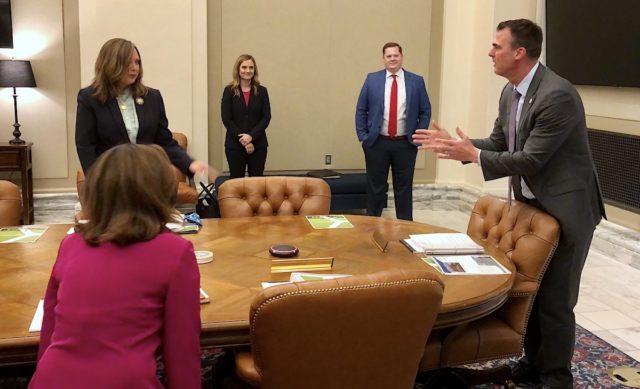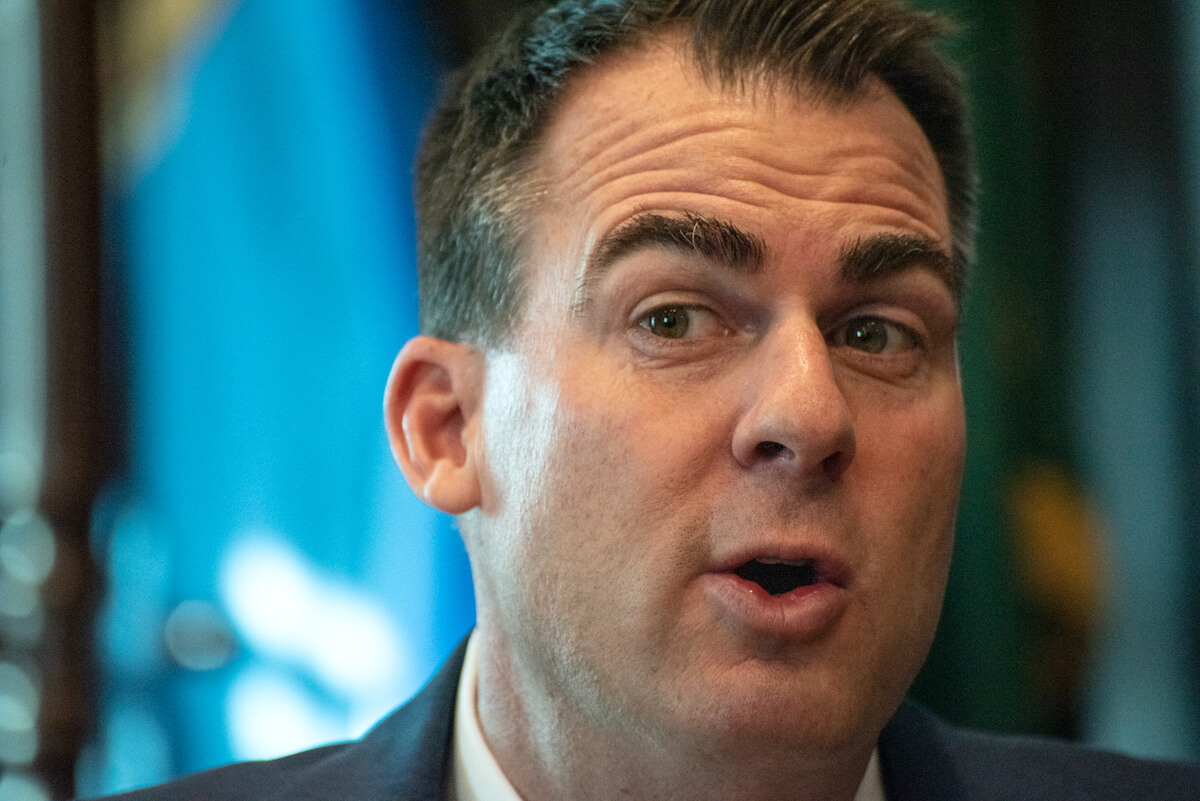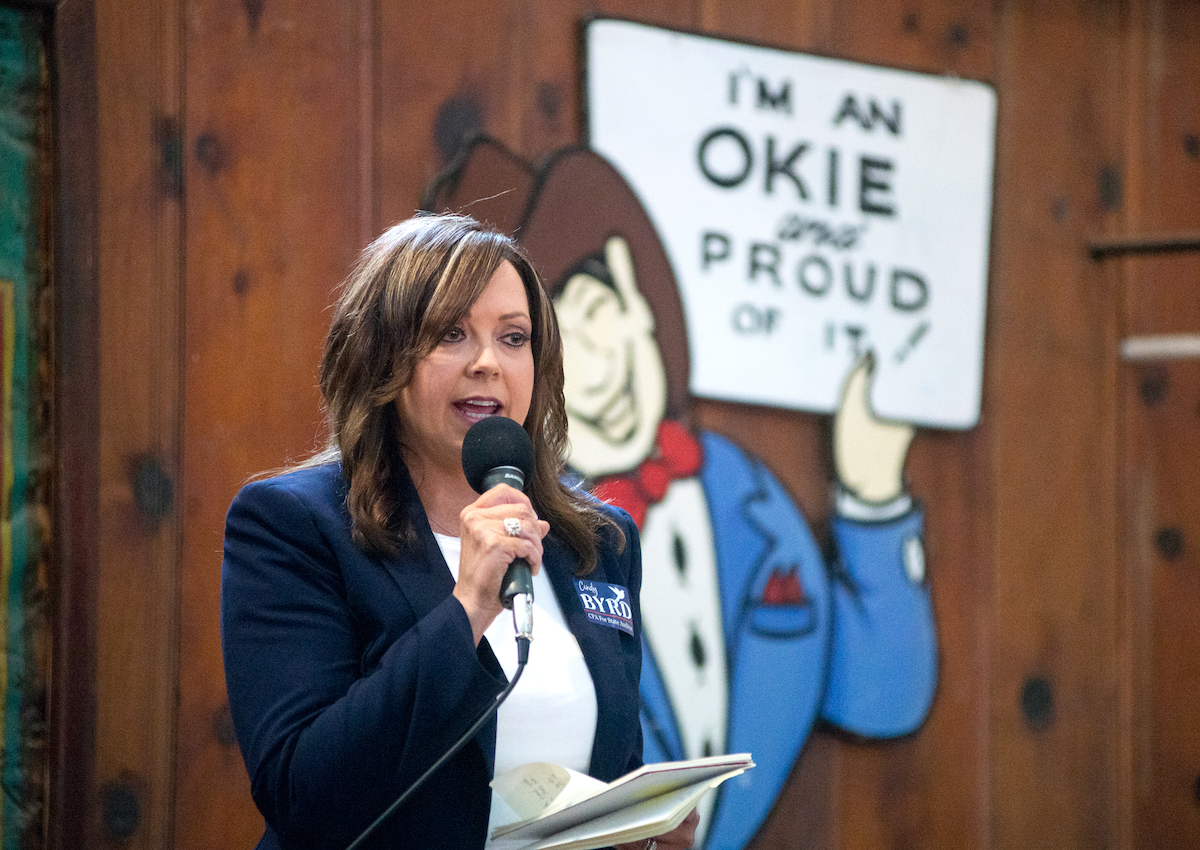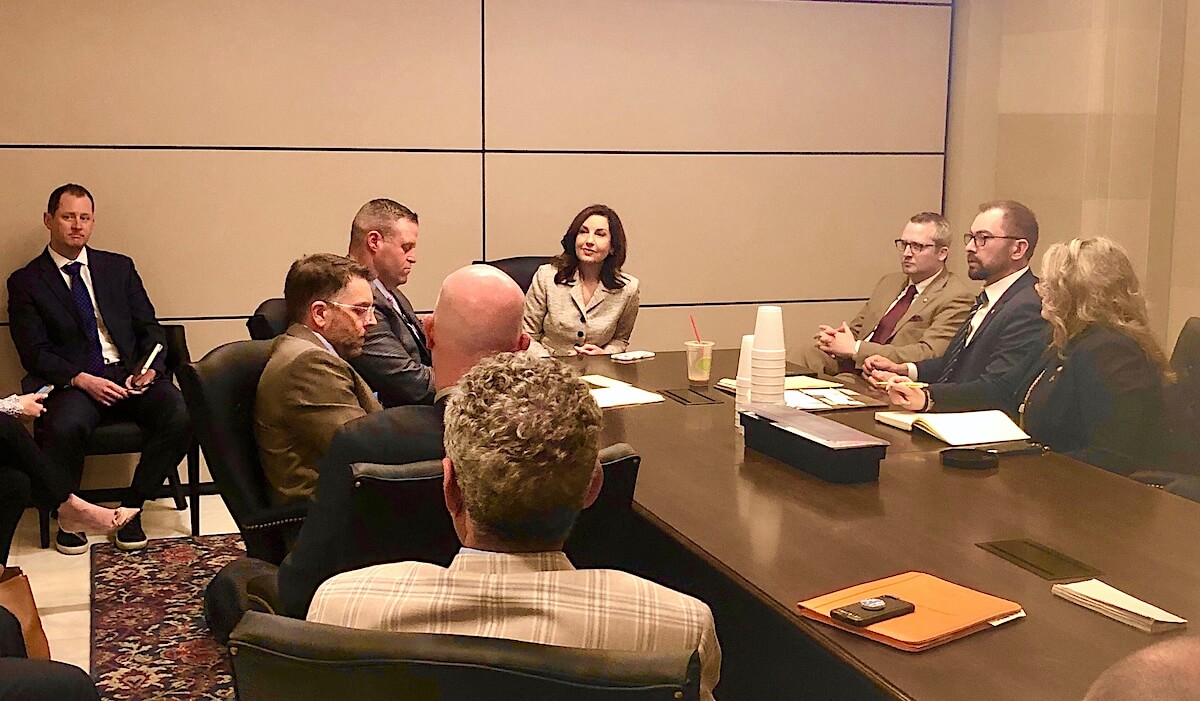
Thursday afternoon, Gov. Kevin Stitt formally asked the State Auditor & Inspector’s Office to complete an audit of the Oklahoma State Department of Education and “all related entities.”
The resulting audit — which will take months, if not a year or more — could become the most comprehensive external review in Oklahoma State Department of Education history at a time when the agency is handling more money than ever, thanks to more than $2 billion in federal pandemic aid and a record state appropriation of $3.2 billion.
“I promised Oklahomans that as governor I would clean up state government to make it more transparent and accountable and I am keeping that promise,” Stitt said in a press release Thursday. “As we make record investments in our public education system, students and parents deserve to know that their schools are spending our tax dollars appropriately and in accordance with the law.”
Stitt’s letter to State Auditor & Inspector Cindy Byrd defined the audit’s scope:
- Identify all revenue sources flowing into the OSDE, including but not limited to, federal funds, state appropriations, taxes and fees. Determine if the revenues were properly allocated and expenditures from selected funds were made in accordance with applicable laws and;
- Determine if the OSDE and Oklahoma school districts are complying with the Oklahoma Cost Accounting System (OCAS) financial transaction reporting requirements and that OSDE is effectively requiring consistent application and timely accountability.
Both Stitt and Byrd have registered committees for 2022 re-election campaigns, and Stitt’s secretary of education (Ryan Walters) has announced his candidacy to succeed term-limited Joy Hofmeister as state superintendent for public instruction.
On Thursday, Walters praised the audit request as “protecting taxpayer resources and delivering transparency to parents.”
Hofmeister called it “another attack on Oklahoma’s public education system.”
“At a time during which there are serious audits we have requested which potentially involve criminal activity, and while 541 school districts are struggling to find normalcy during a pandemic, the governor’s attack on public education couldn’t be worse timing for students, families, teachers and taxpayers,” Hofmeister said.
Epic audit spurred call for ‘further action’ about OSDE, OCAS

Regardless of the political posturing around the sticky and complicated subject of school finance, Stitt’s request comes amid ongoing turmoil for Oklahoma’s education system.
An extended criminal investigation into Epic Charter Schools has yielded only an unusual mutli-county grand jury report in May. The report spurred a last-minute effort to reform the state’s oversight of charter schools, but the bill stalled in the 2021 legislative session’s waning hours.
Byrd’s investigative audit of Epic Charter Schools (released in October 2020) questioned why the Oklahoma State Department of Education had failed to fully identify and rectify the controversial virtual charter schools’ alleged financial malfeasance. Epic used a substantial marketing campaign to become Oklahoma’s largest public school district by student population, but Byrd identified a series of alleged financial improprieties that have resulted in leadership turnover and other adjustments to Epic’s administration.
But Byrd’s Epic audit also noted a failure by the OSDE to properly monitor the OCAS financial reporting system for compliance, stating that “the actual underlying support of revenues and expenditures is typically not verified by [OSDE], nor is actual compliance with documented procedures and policies confirmed.”
That critique prompted 22 Republican legislators to issue a statement in November 2020 encouraging “further action” about the OSDE’s OCAS monitoring.
“If the state auditor is correct in her assessment that the State Department of Education repeatedly neglected its responsibility to ensure compliance with OCAS and other required reports, one must ask if this dereliction of duty was confined solely to EPIC Charter Schools or if it permeates throughout our public education system,” the legislators wrote. “If [OSDE] did in fact routinely fail to perform its regulatory duties, this could result in the discovery of hundreds of millions of dollars of misused funds.”
Seeworth Academy, Western Heights audits pending

Hofmeister’s statement Thursday disagreed with the nature of those legislators’ concerns and with Stitt’s audit request.
In doing so, Hofmeister referenced other pending “serious audits” regarding potential criminal activity in Oklahoma public schools, an unexpected argument for opposing a broader audit of the State Department of Education.
Byrd’s office recently began an audit of Western Heights Public Schools in southwest OKC after the district’s leadership refused to take corrective actions requested by the State Board of Education. Western Heights parents and state leaders have been concerned about financial decisions made by the district’s board chairman and recent superintendent, who have an extensive professional relationship history.
But Byrd’s office also has yet to release its audit (launched in 2019) of a shuttered charter school called Seeworth Academy, which had been authorized by Oklahoma City Public Schools starting in 2006.
The subject of embezzlement allegations against its longtime superintendent and alleged delinquency on behalf of its board, Seeworth Academy existed to serve youths impacted by the criminal justice system. Founded by former Oklahoma Supreme Court Justice Alma Wilson, the charter school shut down somewhat suddenly by a vote of its board, which included a pair of influential public officials: Senate Minority Leader Kay Floyd and Oklahoma Court of Civil Appeals Judge Barbara Swinton. (Swinton initially expressed interest in launching a subsequent charter school to pursue the same objectives.)
Oklahoma County District Attorney David Prater has requested to review Byrd’s audit of Seeworth Academy for consideration of potential criminal charges.
Meanwhile, Hofmeister’s agency has already been visited by federal authorities this year. While the scope of their inquiry was not completely clear, OSDE announced in June that it had uncovered $1.6 million in fraudulent claims for federal funds at third-party child nutrition sites that spanned back to April 2020.
Follow the (complicated sources of) money

The Oklahoma State Department of Education receives more state funding than any other agency — by a large margin — and how Oklahoma funds its more than 500 public school districts is incredibly complicated.
The funding system involves local property taxes, “off-the-top” apportionment of state sales and use tax revenues, apportionment of income tax revenues, lottery revenues, a complex state aid formula to equalize other state funding, a mid-year adjustment based on student enrollment and significant payments to school districts by the Commissioners of the Land Office, a little-known agency governed by Stitt, Hofmeister, Byrd and other statewide officials.
Established nearly 30 years ago to provide a method of standardized financial reporting and to increase the accountability of tax dollars, the OCAS system is used by every public school district in the state.
The State Board of Education Policies and Procedures for Implementation of OCAS and School Finance was presented during a regular state board meeting in March 1992.
School districts must use OCAS to report transactions for all funds and must report financial information into the system by Sept. 1 each year, with Sept. 30 as the deadline to certify that all the information provided is true and correct.
Districts also must report their revenues, including but not limited to:
- Local revenue, such as county ad valorem property taxes, donations and other monies that originate from within district boundaries;
- Intermediate revenue, which includes county revenue such as county sales taxes, mortgage taxes, resale of property fund distribution and county four mill ad valorem;
- State revenue, which includes sales taxes, use taxes, income taxes, gross production taxes, state school land earnings, Bureau of Indian Affairs payments, motor vehicle collections, rural electric cooperative taxes and farm implementation tax stamps;
- Federal revenue, which includes Title I funds, ESSER funds and other revenue collected by the federal government and distributed to state and local educational agencies.
That smattering of revenues filter into a district’s general fund, building fund, sinking fund, activity fund and, in some school districts, a child nutrition fund.
Failure to report information into the OCAS system by the deadline results in a reduction of state aid for the district on a scaled basis. Districts will have 1 percent of state aid deducted for the first month of not meeting the deadline, 2 percent for the second month and so on, up to 5 percent.
In a press release Thursday, Byrd commended Stitt for requesting the audit and said that this type of examination has never been conducted in state, and possibly national, history.
“In the end, the intended purpose of this audit is to ensure per pupil spending and education funding is making it to the classroom,” Byrd said.
Financial accountability and transparency

Hofmeister’s statement Thursday afternoon called the audit an attack on Oklahoma’s public education system and stated that the agency has undergone various audits over the past six and a half years.
“As the governor should already know, the State Department of Education has undergone more than 20 financial, compliance and programmatic review audits by the state auditor’s office in the last six and a half years,” Hofmeister said in a statement. “Additionally, the Governor’s hand-picked Secretary of Education approves every agency expenditure over $25,000 on a weekly basis. Every single spending request has been personally approved by Secretary Ryan Walters.”
Rep. Chad Caldwell (R-Enid), one of the legislators to ask Stitt for the audit in November, released a statement late Thursday afternoon praising Stitt’s request and questioning Hofmeister’s critique.
“With a historic $3.1 billion in public education by the legislature, in addition to over $2 billion in new federal aid, it is more important now than ever that Oklahoma taxpayers know our education dollars are going toward the classroom where they belong,” Caldwell’s press release states. “I was disappointed to hear Superintendent Hofmeister call financial accountability and transparency an attack on public education, especially after the concerns raised public by Oklahoma’s auditor.”
Stitt’s desire to audit the “top 12 agencies” in state government extends back to his 2018 gubernatorial campaign, and he committed to auditing large agencies in his 2019 State of the State address.
Stitt has requested audits of other large agencies, including a request in 2019 to audit the Oklahoma Health Care Authority, including whether individuals enrolled in the Medicaid or Children’s Health Insurance programs met state and federal eligibility requirements. While some criticized that audit as being political in nature, the Stitt administration characterized it as due diligence surrounding the expense of taxpayer dollars.
In 2020, The Oklahoman reported that the OHCA audit found no widespread fraud. But it also noted that the Health Care Authority “does not have adequate internal controls in place to ensure compliance with federal laws and regulations that require only eligible participants receive Medicaid and CHIP benefits.”





















